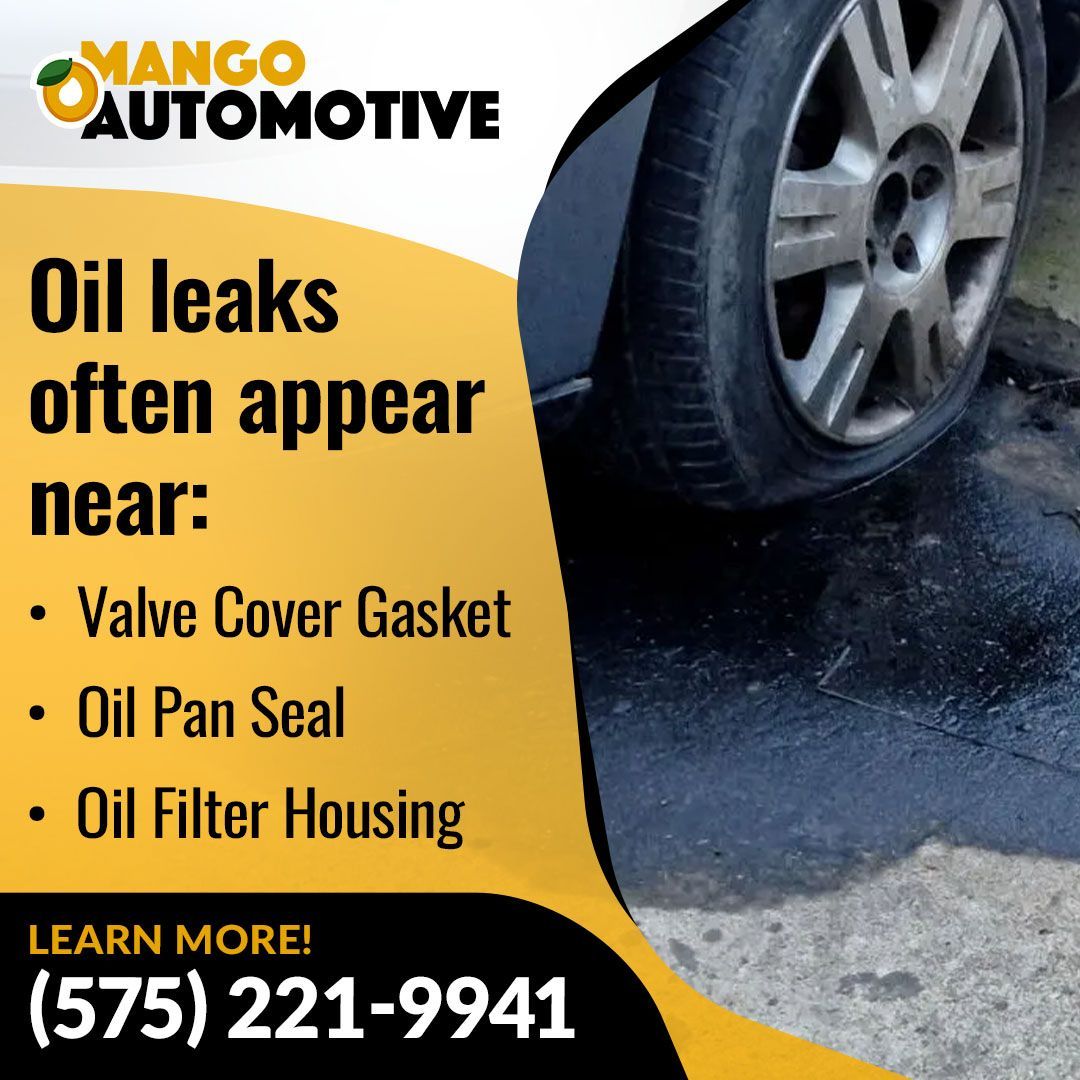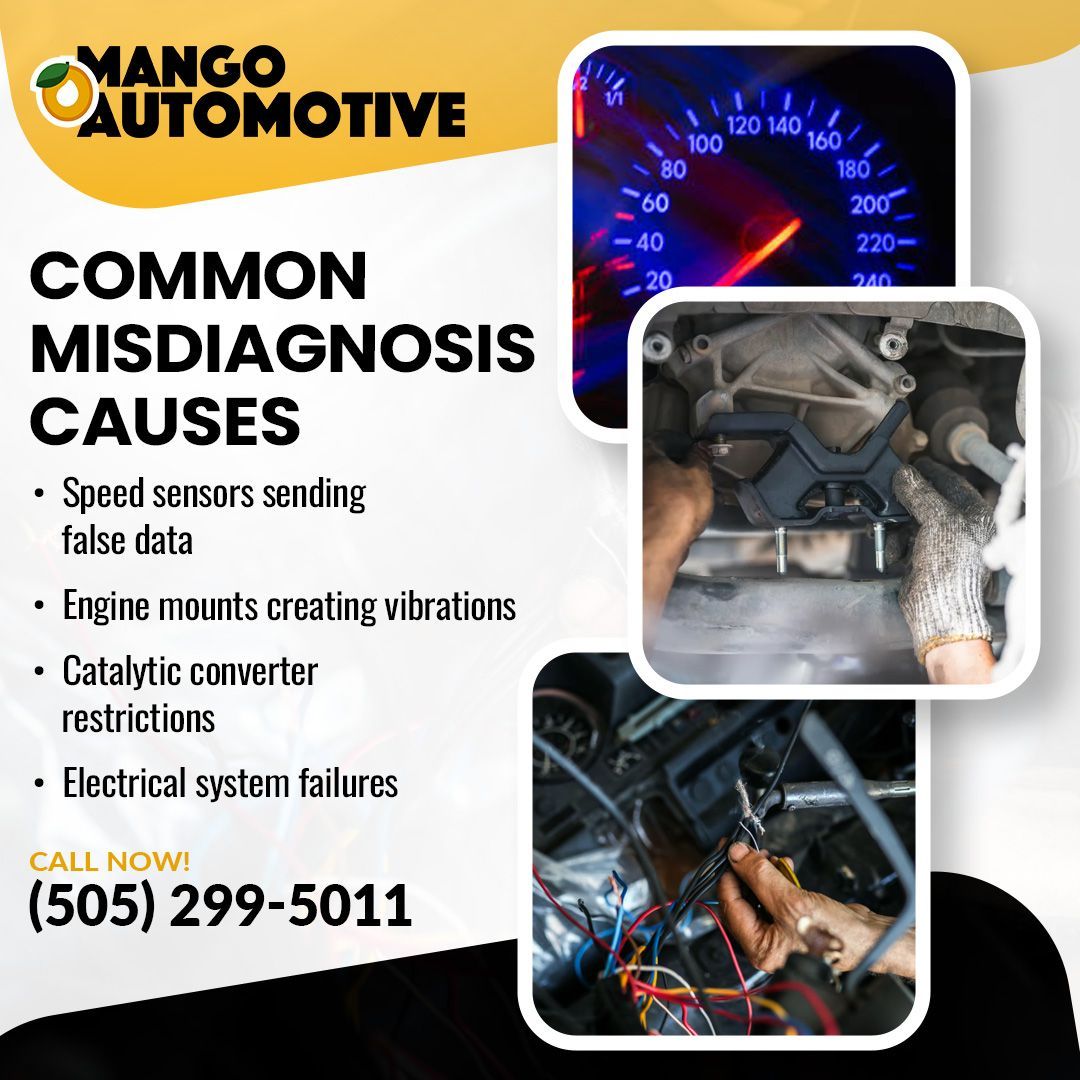Your Guide to Engine Fluid Leaks from a Professional Auto Repair Shop in Las Cruces
Engine fluid leaks can lead to serious mechanical damage if not repaired early. They also reduce performance and may leave drivers stranded without warning. At
Mango Automotive & Diesel, we help drivers in Las Cruces quickly identify the source of leaks and repair them using tested procedures and high-quality parts. Whether it’s engine oil, coolant, or fuel, every fluid plays a vital role in keeping your vehicle running safely and efficiently. This article explains how to spot common engine fluid leaks, where they usually start, and what repairs are needed. Our goal is to help vehicle owners understand what these leaks mean, how serious they are, and when it’s time to visit a local
auto repair shop.

Why Engine Fluids Matter for Your Vehicle
Engine fluids are essential for the proper functioning of your vehicle. They have a specific role in ensuring the engine works efficiently. Without these fluids, your engine could suffer from overheating, excessive wear, and even complete failure.
Engine Oil
It lubricates moving parts within the engine, reducing friction and preventing overheating. It also carries dirt and debris to the oil filter and helps in cleaning the engine.
Without enough engine oil, parts inside the engine can become damaged from friction. The result is not only a decrease in performance but also a higher risk of engine failure. In fact, insufficient oil is one of the leading causes of engine damage. Running a car without oil can quickly lead to expensive repairs or a need for a complete engine replacement.
Coolant
Coolant (antifreeze) regulates the temperature of your engine. It circulates through the engine and absorbs the heat. Without proper coolant levels, your engine may overheat.
Prolonged overheating can warp the engine’s components, including the head gasket, which can lead to an engine breakdown. According to studies, about 40% of engine failures are caused by cooling system issues, including fluid loss.
In the long term, consistent fluid loss will shorten the lifespan of your engine and other critical components. Routine maintenance and prompt auto repairs can prevent the damage caused by leaking engine fluids.
Spotting Engine Oil Leaks Early
Where Oil Leaks Often Start
Engine oil leaks often occur in specific areas of your vehicle, where seals or gaskets can wear out over time. Common sources of oil leaks include:
Valve Cover Gasket
It is located at the top of the engine, sealing the area where the valve cover meets the engine block. The gasket can degrade with time and cause the oil to leak out. This is often seen as oil pooling around the top of the engine or dripping onto the exhaust manifold, leading to a burning oil smell.
Oil Pan Seal
The oil pan holds the engine’s oil at the bottom of the engine. The seal around the oil pan can wear down or crack due to engine heat and pressure, which leads to oil leaking out. You may notice oil dripping from the bottom of the engine, especially when the car is parked for a while.
Oil Filter Housing
The oil filter housing secures the oil filter in place. A faulty or improperly installed oil filter housing can allow oil to leak around the filter. It’s essential to check the oil filter area after every oil change to ensure there are no leaks. If the housing is damaged or the filter is not properly tightened, oil will escape and cause problems.
Catching leaks early can prevent engine damage and costly repairs. If you notice oil stains or smell burning oil, it’s time to visit a trusted auto repair shop before the issue gets worse.
Oil Leak Warning Signs
Dark Puddles Under the Engine
If you find dark brown or black puddles underneath your vehicle, it could indicate an engine oil leak. Fresh oil is amber in color, but over time, it turns darker as it picks up contaminants. If you notice these puddles, it’s time to inspect your engine for leaks.
Smell of Burning Oil
A strong, burnt oil odor could mean that oil is leaking onto the hot engine or exhaust components. When oil comes in contact with these parts, it begins to burn, creating that unmistakable smell. If you catch a burning oil scent, inspect the engine for leaks right away.
Engine Ticking or Knocking
The engine may not receive proper lubrication when oil levels drop due to a leak. This can cause ticking or knocking sounds as engine parts rub against each other. These noises are often a sign that the oil level is dangerously low and needs to be addressed.
Fixing the Problem
Addressing oil leaks promptly is important to prevent long-term engine damage. Repairs can vary from simple to more involved, depending on the source of the leak.
Replacing Gaskets or Seals
The most common solution for oil leaks from the valve cover gasket or oil pan seal is to replace the worn or damaged gasket. This process involves removing the old gasket, cleaning the surface, and installing a new one to seal the area properly.
Addressing Stripped Drain Plugs
A stripped oil drain plug leads to oil leaks from the oil pan. Replacing it with a new plug is necessary to stop the leak.
Checking Torque on Oil Filter
An improperly tightened oil filter can lead to leaks. After installing a new oil filter, it's important to check the torque to make sure it is tightened properly. This will prevent oil from leaking around the filter and causing damage. It’s always a good practice to follow the manufacturer's guidelines on tightening.
Early detection of oil leaks helps prevent major repairs and maintains your engine in the best condition. Mango Automotive & Diesel can keep your engine running smoothly with regular oil checks and expert auto repairs in Las Cruces.
When Coolant Starts to Escape
If coolant begins to escape, it could signal a problem that needs immediate attention from an auto repair expert to avoid overheating or long-term engine damage.
Leak Sources to Watch For
It's essential to locate the source of the coolant leak quickly to prevent more significant issues. Common leak points include:
Radiator or Reservoir Cracks
The radiator is one of the most common places where coolant can leak. Cracks can develop in the radiator due to exposure to heat and pressure. The coolant reservoir, where the overflow coolant is stored, can also crack or leak, especially in older vehicles. If you notice puddles of coolant under the car or a drop in coolant levels, get the radiator and reservoir inspected at an auto repair shop near you for cracks.
Loose Hose Clamps
Coolant flows through hoses that connect various parts of the cooling system, such as the radiator, engine, and thermostat housing. If the clamps holding these hoses in place become loose, coolant can escape from the connections. Regularly checking and tightening hose clamps can help prevent leaks.
Faulty Thermostat Housing
The thermostat housing, where the thermostat regulates coolant flow, can develop leaks over time. This can happen due to worn-out seals or cracks in the housing itself. If the thermostat housing is leaking, you may notice coolant dripping near the engine or the area around the thermostat. Replacing the housing or seal will resolve the issue.
Symptoms of Coolant Leaks
Coolant leaks can often be detected early if you pay attention to key warning signs.
Steam Under the Hood
Steam coming from under the hood is a clear sign that your engine is overheating. It's important to stop driving immediately if you notice steam and allow the engine to cool. Continuing to drive can cause a warped cylinder head or a cracked engine block, which are serious engine damages.
Colored Stains (Usually Green or Pink)
Coolant typically appears as green, pink, or orange colored stains. The color depends on the type of coolant used in your vehicle. These stains can be found around the radiator, hoses, or under your car after parking. If you spot any colored stains, it's a sign that coolant is leaking somewhere, and you should have it inspected immediately.
Temperature Gauge Climbing Higher Than Normal
A rising temperature gauge on your dashboard is another indication of a coolant leak. When the engine is losing coolant, it can no longer regulate its temperature efficiently, causing the engine to overheat. Pull over and check the coolant level if your temperature gauge reads higher than usual, or have it inspected by an auto repair shop.
Repair Methods
When coolant leaks are detected, timely repairs are necessary to prevent engine damage. Below are some common repair methods used to address coolant leaks:
Hose Replacement
Replacing worn or damaged hoses ensures that coolant can flow properly through the system. This simple fix can prevent coolant from leaking and help maintain the engine’s temperature.
Radiator Service or Replacement
If the radiator is damaged or corroded, radiator service or replacement may be required. Depending on the damage, an auto repair technician may recommend cleaning, repairing, or replacing the radiator to restore proper coolant circulation.
Pressure Testing for Hidden Leaks
Sometimes, coolant leaks may not be easily visible. In such cases, pressure testing can help locate hidden leaks. This involves pressurizing the cooling system to simulate operating conditions, which identifies even small leaks that may not be immediately apparent. It’s an effective method for pinpointing issues in the radiator, hoses, or seals.
Fuel Leaks in the Engine Bay
Fuel leaks in the engine bay are a serious concern that should be addressed immediately. Even small fuel leaks can be hazardous and lead to significant safety risks, including the potential for fire. At Mango Automotive & Diesel, our auto repair technicians specialize in identifying and repairing these dangerous leaks.
What Makes Fuel Leaks Risky
Fuel leaks pose a significant fire hazard. Even the smallest spark can ignite leaking fuel, leading to potentially catastrophic fires. Additionally, fuel leaks can result in emission violations, as excess fuel escaping the system can lead to environmental pollution. If you notice the smell of gasoline or any signs of a fuel leak, it's essential to seek professional help immediately. Ignoring fuel leaks can also impact vehicle performance, reducing fuel efficiency and causing engine misfires.
Common Areas Where Leaks Begin
Fuel leaks often occur in specific parts of the fuel system. Identifying the source of the leak is essential for timely repairs and ensuring your vehicle remains safe to operate. At Mango Automotive & Diesel, we thoroughly inspect the fuel system to identify and address these issues.
Fuel Injector Seals
Fuel injector seals are common culprits for fuel leaks in the engine bay. Exposure to high heat and pressure can degrade these seals. A leaking injector seal can allow fuel to escape, leading to the smell of gasoline or visible leaks around the injectors. If you notice fuel around the injectors, they should be inspected, and the seals may need to be replaced. Timely repairs at an auto repair shop can prevent further damage to your fuel system and improve engine performance.
Damaged Return Lines
The fuel return lines transport unused fuel back to the tank after the engine has used what it needs. These lines can also become damaged due to heat, age, or wear. Cracks or holes in the return lines can cause fuel to leak out, resulting in visible fuel puddles beneath the vehicle. Regularly inspecting fuel lines can help prevent leaks and maintain engine performance. At Mango Automotive & Diesel, we provide thorough checks to keep your system leak-free and safe.
Loose Fuel Rail Fittings
Fuel rail fittings hold the fuel injectors in place and maintain a sealed connection. If these fittings become loose or corroded, they can cause fuel to leak out. This issue is often associated with high-pressure fuel systems. Tightening or replacing these fittings is necessary to prevent leaks. Experienced auto repair technicians can quickly address these issues to restore the integrity of your fuel system.
How to Detect Fuel Leaks
Fuel leaks can be tricky to spot, but there are some clear signs that indicate something is wrong. At Mango Automotive & Diesel, our experienced team specializes in diagnosing and fixing fuel leaks to keep your vehicle running safely.
Strong Gasoline Smell
A strong gasoline smell is one of the most common signs of a fuel leak. This smell is not only unpleasant but can also signal a fire hazard. If you smell gasoline, it’s essential to get your vehicle inspected immediately.
Hard Starts or Rough Idle
Hard starting or rough idling can also be a symptom of a fuel leak. When there’s a loss of fuel pressure due to a leak, your engine may struggle to start or run smoothly. Leaks can also result in an inconsistent fuel supply that causes rough idling and poor engine performance. If you're experiencing any of these symptoms, it may be time to bring your vehicle to Mango Automotive & Diesel for a thorough inspection.
Noticeable Drip or Vapor
A noticeable drip or vapor of fuel under the vehicle is another clear indication of a fuel leak. If you see fuel dripping from the engine bay or the ground beneath your car, you should take immediate action to prevent a larger issue. Fuel vapors can also build up around the leak, which can be especially dangerous in hot weather conditions.
Steps for Correction
Once a fuel leak is detected, the next step is to address it quickly and properly to avoid further damage and safety risks.
Line Replacement or Sealing
In many cases, fuel lines need to be replaced or sealed to stop the leak. A professional auto repair shop can assess the condition of your fuel lines and determine whether they need to be replaced or sealed to stop the leak.
Injector Inspection and Maintenance
Fuel injectors are another area that can often develop leaks, especially if the seals wear down. Injector inspection and maintenance are essential to identify any small cracks or wear that may lead to fuel escaping. At Mango Automotive & Diesel, our team can perform a thorough inspection of the injectors and replace any faulty seals or components.
Leak Tracing with Diagnostic Equipment
Diagnostic equipment is necessary for finding hidden fuel leaks. This equipment uses pressure testing and fuel system diagnostics to pinpoint leaks that aren’t immediately visible. Using advanced tools, we can detect leaks in hard-to-reach areas and correct them before they lead to significant damage. Our team at Mango Automotive & Diesel uses the latest technology to identify leaks and provide expert auto repairs in Las Cruces.

Mango Automotive & Diesel for Repairing Engine Fluid Leaks in Las Cruces
Professional mechanics can quickly identify and fix the problem, ensuring that your vehicle stays in top condition. When you choose Mango Automotive & Diesel for your auto repairs in Las Cruces, you are choosing quality, reliability, and expert service.
Detailed Inspection
Our experienced technicians conduct a thorough inspection of your vehicle to identify the source of the engine fluid leak. Our advanced diagnostic tools help us detect even the most hidden leaks. Whether it’s an engine oil leak, a coolant leak, or a fuel leak, we pinpoint the problem with precision.
Honest Repair Recommendations
At Mango Automotive & Diesel, we believe in providing our customers with honest and transparent repair recommendations. After identifying the leak, we’ll explain the cause, suggest the best solution, and discuss the estimated costs. You’ll never face surprise charges or unnecessary repairs.
Work Backed by Experience in Diesel and Gas Engine Systems
With years of experience working on both diesel and gas engine systems, our auto repair technicians are well-versed in handling a wide range of engine fluid issues. From repairing minor leaks to dealing with more complex engine fluid problems, we offer reliable solutions tailored to your vehicle’s specific needs.
VIP Members Get Ongoing Fluid Support
As part of our VIP Membership, customers receive unlimited fluid top-offs—a convenient service to help reduce the risk of engine fluid issues. Stop by anytime for a complimentary check and refill of vital fluids like engine oil and coolant. This ongoing care helps catch small problems early and supports the long-term reliability of your vehicle between scheduled visits.
Stay Ahead of Fluid Leaks Before They Escalate
Addressing engine fluid leaks early is essential for maintaining the performance and longevity of your vehicle. Whether it's engine oil, coolant, or fuel, timely repairs can prevent costly damage and improve your car's efficiency. Mango Automotive & Diesel is here to provide expert services tailored to your vehicle's needs. We diagnose and repair any fluid leak, ensuring your vehicle runs smoothly and safely.
If you're noticing any signs of engine fluid leaks, don’t wait until the problem worsens. Trust the experts at Mango Automotive & Diesel for fast, reliable auto repairs in Las Cruces. Call us today at (575) 221-9941
to schedule an inspection and get your car back on the road with confidence!












